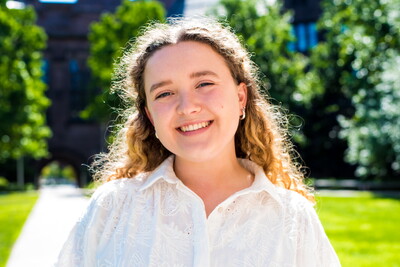Building Energy Sovereignty Through Clean Energy: Meet Hilary Griggs

The Planetary Solutions in Clean Energy - Internship and Fellowship Program (PSiCE) offers summer research and internship opportunities to students at Yale who are committed to advancing and pursuing a career in the clean energy field. This year we spoke with students in the initial cohort to learn about their inspiration, goals, and experience through the program.
You may not always associate American history with clean energy, but one junior from Kansas is working to ensure we all understand the advancement of clean energy depends on our ability to incorporate the past into the future.
Yale College student Hilary Griggs was selected for the inaugural Planetary Solutions in Clean Energy (PSiCE) cohort. Hilary’s goals through the program? – To highlight and showcase the need for energy equity within marginalized and BIPOC communities. This past summer, Hilary worked with the Indigenized Energy Initiative (IEI) to develop a database system to keep track of Tribal communities and history.
“I’ve always been interested in clean energy and the environment in general. Prior to getting to Yale, I thought about being an environmental science major, not history, but I have continued my interest in clean energy.”
Primarily, Hilary is passionate about the role Native American tribes play in land preservation and energy output and how clean energy can sustain these communities. Through the PSiCE program, Hilary worked with the Indigenized Energy Initiative to hyperfocus on Native American partnerships in clean and renewable energy and to create job opportunities for people living in the energy-producing sector of the United States.
Hilary notes that tribes have historically been disenfranchised by fossil fuels and the federal government. Her aim is to not only support work that empowers Indigenous communities through their tribal knowledge of the environment and energy but also assert the sovereignty they have over the land.
“Energy can be a tool for sovereignty. Native American tribes are technically sovereign but there are many ways in which, because of the history with the federal government, their sovereignty has been infringed upon over time. One example of this is energy because oftentimes tribes are reliant on outside utilities that aren't run by the tribes—they are run by non-native people and often employ exploitative practices that heavily harm native communities.”
Hilary spoke of her plans to travel to the North Cheyenne Tribe in North Dakota to learn more about the role Native Americans play in the history of energy in the area. She hopes expanding the IEI database to ensure accurate data regarding tribes and energy usage will provide the foundation needed to create programs specifically targeting tribal and rural communities.
“I think the way IEI has partnered with and is led by native people coming from the top down and giving them tools to build their own community is really great for a clean energy future. It makes it sustainable in the long term because instead of just coming in and building a solar farm and then leaving, you're coming into a community and the community itself is building its own capabilities to repair the solar panels and continue to build themselves up.”
Hilary is also passionate about the law and plans to intersect law with her goals for clean energy. Working with a number of rural communities in her home state, she believes that policy is an important part of understanding and championing marginalized communities. She plans to pursue law upon completion of her undergraduate degree and plans to educate public and private entities on how fossil fuels can collaborate with clean energy for long-term sustainability in the energy sector.
CBEY is proud to have been joined by Hilary Griggs as an inaugural PSiCE intern.
